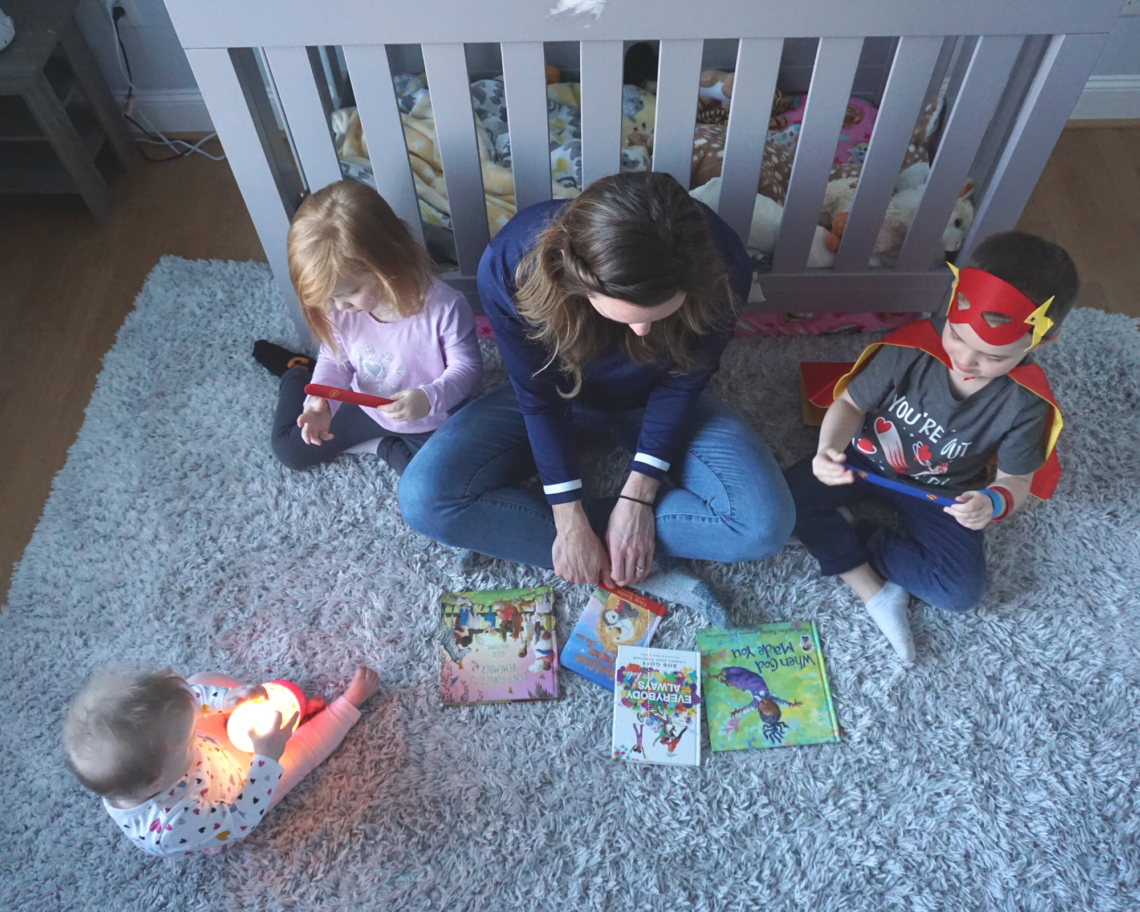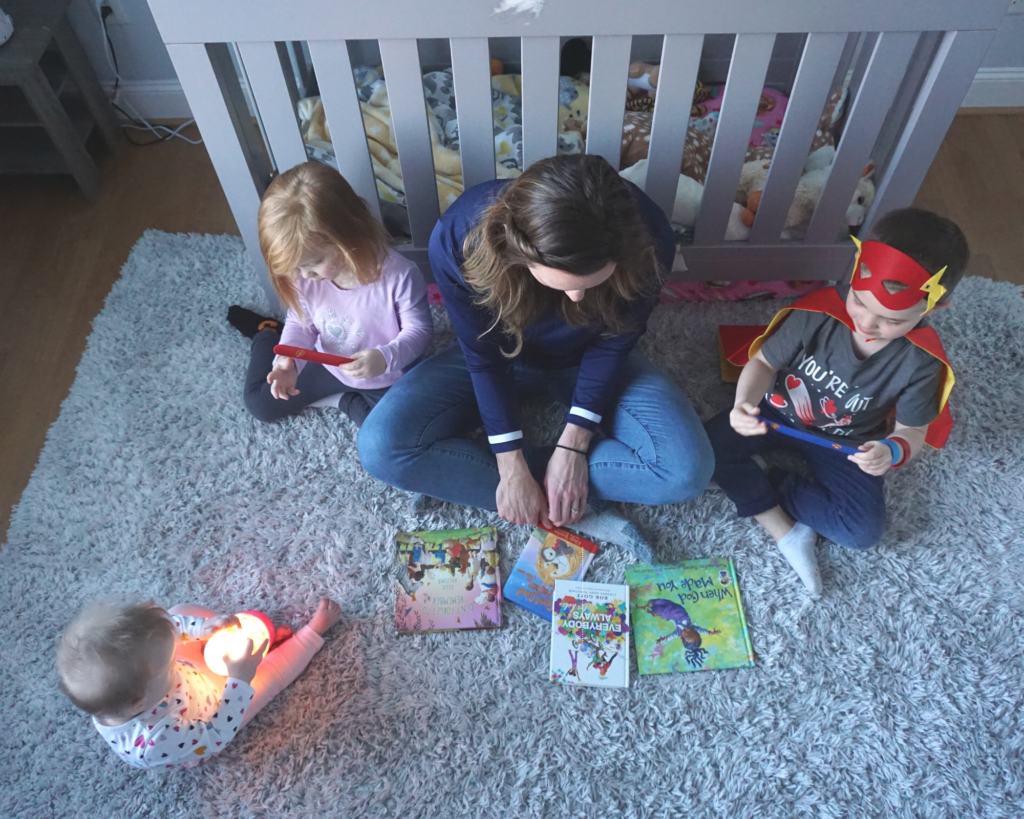
How to Talk to Your Kids About Death and Suffering in the World: 4 Truths to Share

Knowing how to talk to your kids about death and suffering can be intimidating.
I remember the first time I talked about death with my oldest son. He was 4 years old and very concerned about his flowers wilting. A slew of questions ensued: “Why do they look different?” “What does wilting mean?” “But, I don’t want them to die!” “Do flowers go to heaven?”
This lead to a conversation about how one day we will all die, but that for followers of Jesus, death is just the beginning. I read a book by John Mark Comer recently about heaven and one of the lines stuck out to me. “YOLO, except if you’re a follower of Jesus.” I’m not sure most of us live with that eternal perspective in mind. We end up chasing after temporary highs as if there’s nothing after this life. Your view of what happens after we die will shape how you reconcile and process death and suffering. These two topics are intricately woven together.
Suffering Will Come
How do you talk to your kids about suffering? What about death? My kids have lived through a pandemic, persecution of women and Christians in Afghanistan, an attack on Ukraine with many civilian casualties (that is still underway), and the death of my grandmother whom they loved. That’s just been in the last two years. Those won’t be the last events they witness related to death and suffering. The longer you live, the more likely you are to experience losses of various kinds.
My oldest kids are three and five years old, so this is an entry level conversation for young children on the topics of death and suffering. I wanted to give you a peek into some of our recent conversations and give you ideas as you wrestle through these topics with your own children.
Here Are 4 Truths to Share as You Talk to Your Kids About Death and Suffering:
It’s Ok to Be Sad
Most of us aren’t very good at giving ourselves room and time to grieve. We can look to Jesus as an example for this. We see Him weeping alongside his friends at the death of his friend Lazarus as He shared in their pain. It is a natural response to grieve when we experience or witness the suffering of others. This is a way to demonstrate compassion and empathize with their situation. In fact, Romans 12:15 says, “Rejoice with those who rejoice, weep with those who weep.”
The idea of lamenting is woven throughout stories of the Bible. Lament in the Bible looks like prayer, praise, and seeking the Lord in times of pain and suffering. These are the types of prayers where we cry out to God in an honest and vulnerable way. It’s a product of being in relationship with Him. We can trust Him with our doubts, pain, mourning, and fear. Don’t be afraid to allow yourself space to mourn death and suffering in the world and in your own life. Boldly bring your requests to God, acknowledge the promises He gives us in His Word, and trust Him in the midst of the storms of life.
It’s Not Supposed to Be This Way
This ties right into why we feel sad when we see or experience death and suffering. It’s because innately we know that it is not supposed to be this way! When sin came into the picture, it changed the dynamics of the world entirely. Death was not in God’s original design and neither was suffering. 1 Corinthians 15:26 says that, “The last enemy to be destroyed is death.” Death is in direct opposition to the things of God. God is the author and source of life. Human life is valuable and worth grieving because we are made in the image of God.
Don’t Be Surprised When Suffering Comes
The Bible is pretty clear that we will experience suffering in the world. Whether it’s for our faith in Jesus, physically, or otherwise, we’re given fair warning that it will happen. Compared to the rest of the world, the average American doesn’t experience religious persecution and suffering like people in other countries and places. In general, we are shielded from much of the daily physical suffering of the rest of the world. What this can cause is surprise when suffering comes into our life. There’s a, “Why me?”, mentality. Refer back to our last point that things weren’t supposed to be this way. It’s from our own choices, the choices of others, or the state of the world that suffering occurs. Suffering is a natural consequence of sin in the world.
One Day Everything Will Be Made Right
Though we may experience suffering and injustice in our lives and in the world, it won’t be like this forever. If you’re a follower of Jesus, we look forward to a day when Jesus will come and make everything new. Death and suffering will be eradicated, peace will reign in the world, and everything will be as it should. We have a future hope that can carry us through even the darkest of times. Remind your kiddos of that hope.
I talked to my oldest child about how one day, Jesus will come back and make everything new. There won’t be any sadness or death or suffering anymore. His favorite part is how the animals that you normally wouldn’t be able to cuddle will be extra cuddly in the New Earth (his words, not mine). Peace will saturate every part of creation. See Isaiah 11:6-9 for context.
Are You Ready?
Since that conversation, my son keeps saying that he’s ready for Jesus to come back. He’s ready for the New Earth to be here, where everything is good and perfect and right. He’s ready for evil to be conquered for good and for all of the loss that humanity has experienced since the beginning of time to be redeemed. The earnestness with which my now 5 year old longs for Jesus to come back challenges my 32 year old heart.
Am I that ready? Am I yearning for a time when we reign as priests with Jesus in this new kingdom? The answer is mostly no, which means I’m likely too fixed on the things of this world. What about you?
Should We Even Talk to Our Kids About Death and Suffering?
Some people would say to totally shield your children from anything remotely involving death and suffering. I feel a bit differently. Take advantage of opportunities when your kids ask questions. I allowed an innocent question from my 4 year old about flowers wilting to launch us into an introduction of a theology of death and dying. I also bring them into our prayers and mourning for the losses in our lives. Both in our own families and in the world.
My 5 year old son and 3 year old daughter have both been huddled next to me in prayer, sometimes on our knees with me in tears. We have prayed for the women and Christians in Afghanistan, we have prayed for many people to know the Lord in the midst of war in Ukraine, and we have prayed for the Lord to conquer evil when it seemed that evil was winning.
No Fear Here
We as Christians know that Jesus has already conquered death. Death is not something to fear for followers of Jesus. As I’ve heard believers in Afghanistan say, they’re not afraid to die because they know they meet Jesus on the other side. They’re ready anytime He calls them home.
Their hearts for the Taliban to know Jesus through their testimonies is mind-blowing. They convicted me so strongly about my animosity for these evil men and desire for justice that they’ve changed the way I pray.
For my kids, because of those Christians in Afghanistan, they pray that God would “make the bad guys good guys.” Aka, that evil would be transformed and eradicated by the presence of Jesus. We prayed for a moment like Saul had on the road to Damascus in Acts 9. A man who gained no greater joy than imprisoning and killing Christians, ended up becoming one himself. His testimony carried the gospel to the ends of the Earth.
Why Parents Avoid These Conversations
I think we avoid talking to our kiddos about suffering and death because we ourselves haven’t worked through the cause behind it. We can’t walk our children through things that we haven’t worked through ourselves. If you’ve been avoiding processing the presence of evil and suffering in the world, grab a Bible and some friends and start a discussion. Seek the Lord in prayer and wrestle with your doubts. That’s the only way you will be able to give your kids a thoughtful response when they ask you about the tough questions in life.
I hope you have some tools in your toolbox to talk to your kids about death and suffering now. I’ll link some resources at the bottom of this post for further reading. Thankful to have you here in the SIE community!
Be sure to check out my other parenting resources here.
Additional Resources
Check out these books for additional reading:
Walking with God through Pain and Suffering: Tim Keller

Where is God When it Hurts?: Philip Yancey

The Problem with Pain: C.S. Lewis

The Broken Way: Ann Voskamp

Let’s Connect!
Come say hello on IG and Facebook! Follow me for more parenting resources.





One Comment
Pingback: